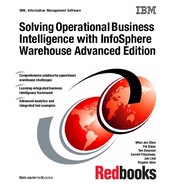Chapter 5. Temporal data management and analytics in an operational warehouse 179
This type of temporal capability typically includes the following use cases:
???? Auditability - What records of a table have changed in the data warehouse,
and when did they change?
???? Recoverability - Can we restore a table record to a previous state of values at
a particular point of time in the past?
???? History - Related to auditability and recoverability, can we view a prior state of
values of a table record at any time in the past?
???? Traceability and governance - Did a particular change to a value in the
database record occur at the correct time, or has a series of changes across
tables occurred in the correct sequence?
Because operational data warehousing deals with frequent inserts and updates
of the data in the system, this kind of temporal awareness is particularly useful to
manage data consistency, especially for sensitive data.
5.1.2 Temporal concepts
From the preceding discussion about use cases, several repeating concepts
have emerged. These concepts are defined in summary here and are further
developed in the discussion of temporal awareness in InfoSphere Warehouse
Advanced Enterprise Edition 10.
Business time
Business time refers to a date or time stamp that has particular value to a
business process or in a business context. Validity dates and effective dates for
policies, activities, or any business process are example uses of business time.
Business time is more interested in when something happens, will happen, or is
valid in the real or business world, rather than when something happens in the
database system. For example, business time is interested in when a lease
agreement is in force, not when the lease agreement was entered into the
database.
System time
System time refers to a time stamp of precisely when a database record was
inserted, updated, or deleted in the database system itself. System time is more
concerned with the exact moment when any kind of data change occurred in the
database (the database transaction) independent of the business context of that
change. For example, system time is interested in when a transaction occurred
requesting that a customer’s mail be held while they are on vacation rather than
the dates that the mail will be held.
180 Solving Operational Business Intelligence with InfoSphere Warehouse Advanced Edition
Bitemporal
As the name implies, bitemporal indicates the ability to track and operate on both
business time and system time. There are many operational warehousing
scenarios where this is required, such as the ability to track when a customer
requested an update to their banking account (for purposes of recovery and
auditing) and to track when the change is to take effect (such as a planned
change of address).
Start time
Start time applies to both business and system time. In the context of system
time, it refers to the time stamp (date and time) indicating when a record change
(insert, update, delete) occurred in the data warehouse system. For system time,
the start time is always in the past or (for an instant, anyway) in the present.
Because it tracks when a database transaction occurs, it is never in the future.
In a business time context, it refers to the time (date or time stamp) when
something is valid or takes effect, such as a change to a customer account.
Business start time can refer to past, present, or future time.
End time
End time applies to both business and system time. In the context of system
time, it refers to the time stamp (date and time) indicating when a record in the
database system is or was valid. For the record that is currently valid, the end
time refers to some point in the distant future that logically means “forever.” For
history records, the end time refers to the first moment that a record was no
longer a current record in the database, that is, the time when some database
transaction changed the record.
In a business time context, it refers to the date (or time stamp) at which point
something ceases to be valid or in force, such as a promotion, policy, or
temporary change of account status. In many cases it is the “expiration date” for
some business process or activity, for example, the last date on which a lease
agreement is in force or the last day on which a contracting bid may be accepted.
For both system and business time, end time may refer to the past, present, or
future.
Inclusive-inclusive time period
Inclusive-inclusive indicates that a time period includes both its start time and
end time (dates or time stamps). This is also known as a closed-closed period.
The period starts at the moment of the start time and runs up to and including the
date or time of the end time.
..................Content has been hidden....................
You can't read the all page of ebook, please click here login for view all page.
